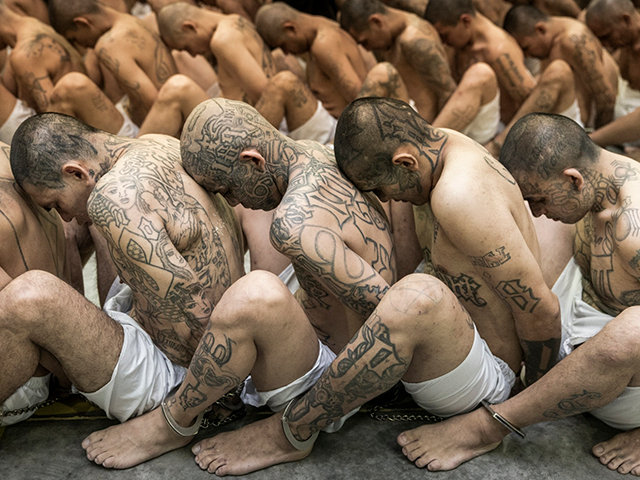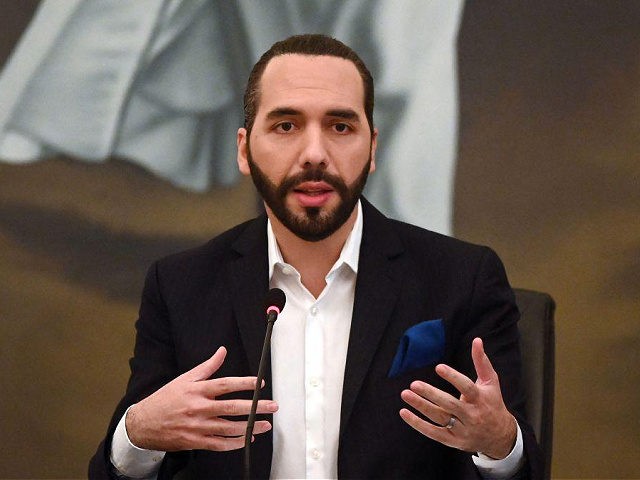El Salvador’s President Nayib Bukele claimed on Thursday that, as of Wednesday, his country reached the milestone of 365 non-consecutive days without homicides since he took office in 2019.
“We ended May 10, 2023, with 0 homicides nationwide,” Bukele posted on Twitter. “With this, it’s 365 days without homicides, a full year.”
A source from the office of the president’s press secretary clarified to the French news agency Agence France-Presse (AFP) that the 365 days refer to “the sum of the days without homicides from 2019 to date” and does not mean that El Salvador has gone a full year straight without homicides.
Bukele, who took office in June 2019, has waged a fierce war against El Salvador’s violent gangs such as Mara Salvatrucha-13 (MS-13) and 18th Street, making their elimination a crucial goal of his administration.
El Salvador has been under a de facto state of martial law via a state of emergency decree since March 2022 to combat gang violence. The decree was passed after the Central American nation logged its most violent day in over a century, in which police documented 62 homicides in a single day. The state of emergency decree, which originally lasted 30 days, has been continuously renewed on a monthly basis through today and is expected to be renewed before the most recent extension ends on May 16.
Bukele has used the decree’s emergency powers to enact a fierce crackdown on El Salvador’s gangs, which had long made the country one of Latin America’s most dangerous. The crackdown has resulted in a dramatic reduction in gang-related violence and the “virtual disappearance” of the gangs in the nation’s communities.
The Salvadoran president also used the decree to commission the expedited creation of the Center for the Confinement of Terrorism (CECOT) a 40,000-bed “mega prison” that the Salvadoran government has begun to fill in batches.

In this photo provided by El Salvador’s presidential press office, inmates identified by authorities as gang members are seated on the prison floor of the Terrorism Confinement Center in Tecoluca, El Salvador, Wednesday, March 15, 2023. (El Salvador presidential press office via AP)
“El Salvador went from being the most violent and bloody country in the world, a country that few dared to visit, to becoming the safest on the continent, which has attracted attention abroad for all the progress it has made and now they want to travel to know,” a statement published on Thursday by the Salvadoran presidency’s press secretary on Facebook read.
“Since March 27 of last year, to date, more than 68,200 gang members have been captured and 2,700 firearms of various calibers, 6.2 tons of drugs, 3,610 motor vehicles of all types,16,500 cell phones and $3 million in cash have been confiscated,” the statement continued.
Salvadoran opposition lawmakers questioned the announcement, arguing that deaths of citizens that allegedly took place under state custody were not counted in official statistics.
“The government’s response to homicides of saying that they do not exist is something that is false, in the sense that there have been known cases of deaths and murders,” Anabel Belloso, Salvadoran lawmaker from the far-left Farabundo Martí National Liberation Front (FMLN) party, asserted. “We cannot fail to mention the deaths in state custody inside the prisons, it would also seem that they are not lives, because the state does not register them or at least does not say so publicly.”
Bukele was a member of the FMLN for much of his career before being expelled in 2017 for “violating the principles of the party.”
“I do not believe that the homicide rate, neither now nor before, was ever the only or the best indicator to measure the incidence of violence in our country,” said Johnny Wright Sol, a lawmaker from the center-left Nuestro Tiempo (Our Time) party. “It seems to me that we are still a very violent country and although it can be recognized that the criminality originated by gang groups has been drastically reduced, we do not know how sustainable this is in the future.”
The veracity of El Salvador’s homicide statistics was also questioned by a report published in June by the bilingual conservative outlet El American, now known as Voz.
The report accused Bukele of having cut a deal with MS-13 and other gangs in order to falsify homicide statistics. The deal reportedly involved having gangs hide their killings by digging mass graves that in turn the Salvadoran government would not officially reveal, thus documenting the killings as “disappearances” rather than homicides.
The deal allegedly came to an abrupt end when Bukele ordered a spree of mass arrests against prominent gang members, which preceded the documented spike in homicides in March 2022.
The Biden administration imposed sanctions in 2021 on El Salvador’s prison system chief and Vice Minister of Justice and Public Security Osiris Luna Meza and the Chairman of the Social Fabric Reconstruction Unit Carlos Amilcar Marroquin Chica, accusing both men of having engaged in undercover negotiations with leaders of MS-13 and 18th Street. The Biden administration also accused Bukele’s officials of providing financial incentives to both gangs in 2020 to ensure that incidents of gang violence and the number of confirmed homicides remained low.
Bukele’s crackdown on gang violence and its related policies has been largely instrumental in the Salvadoran president’s continued high approval ratings, which remain at around 91 percent as of early May, eclipsing other Latin American heads of state by a large margin.
Bukele, whose five-year term will end in 2024, has expressed his intention to be re-elected for a new presidential term — a decision that, despite the nation’s constitution explicitly forbidding it and outright heavily penalizing those who so much as promote the concept of presidential reelection, is highly favored by Salvadoran citizens, according to polls published in March.
Christian K. Caruzo is a Venezuelan writer and documents life under socialism. You can follow him on Twitter here.

COMMENTS
Please let us know if you're having issues with commenting.